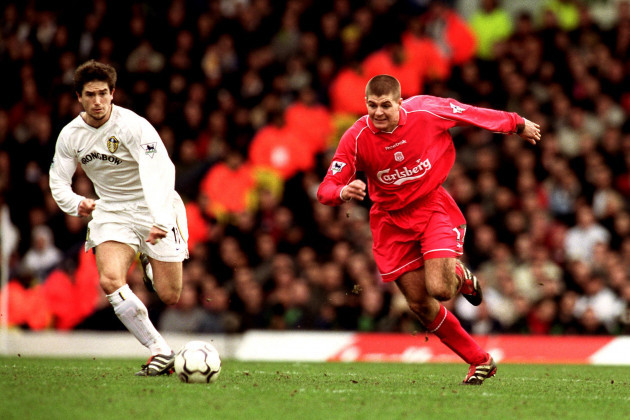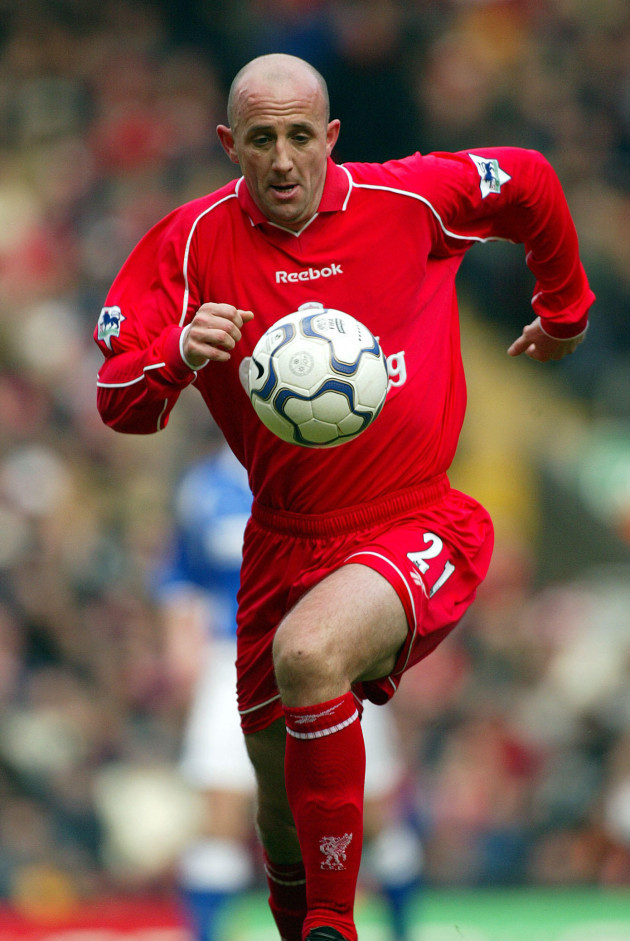STEPHEN McPHAIL can see things as clearly now as he did on the pitch at Stamford Bridge 25 years ago.
Well, most of it.
“I don’t actually remember striking the ball,” the former Leeds United midfielder says of his first goal in English football against Chelsea in December 1999. “But everything else about it is still in my head.”
He feels the joy of the moment, too, and the clarity of sensing it unfold on the pitch before anyone else.
“It was like a vision,” McPhail says.
“Harry Kewell had it then Lee Bowyer made the run down the right. I was coming from the opposite side and knew I had to run off my man, it was Gus Poyet, to make up the ground into the box. It felt like I knew exactly where I had to be for the ball. A lovely feeling.”
So was the finish.
Leeds went top of the Premier League. McPhail had just turned 20 and he was part of an emerging squad – Ian Harte, Jonathan Woodgate, Bowyer, Kewell, Alan Smith – produced by the academy and guided by David O’Leary.
“Dennis Wise played in that game,” McPhail recalls. “I knew what was coming from him because I’d been up against him before. He knew I was a kid and he never stopped at me all game; pinching me, kicking me, calling me all sorts.
“But what a player. Like David Batty who was at Leeds. People have this idea about them as just being physical and aggressive but it’s only when you play against them or alongside them you realise how fast they see the game, how quickly they do things.”
Leeds visit Chelsea in the fifth round of the FA Cup this evening, a quarter of a century on. They have not won in that corner of west London since.
The years have passed but that evening is a point in time that will always stand still for McPhail.
“I see it with my own son now, he can get bored watching full games, social media kind of kills it because everything gets clipped up and goes online. They see the goals or whatever but the key moments and where you learn about the game are all within the smaller details of the game,” McPhail says.
“Coming through at Leeds we watched live football every day – the first team, reserves, youth team. The understanding of the small details are the key to learning about the game, of knowing when to sense that those moments will come for you.
“I trained with Lee [Bowyer] every day so knew what he was like, but I’d also seen him in that situation and seen other players in that same situation running down a channel when the pull back is all that is on.
“It might not always have landed and led to a goal but by seeing those moments happen it means you can get that feeling for when that moment will come in a game.”
McPhail is 44 now and sporting director at Shamrock Rovers. His son, Joel, is emerging through the academy there and, recently, captainted the Republic of Ireland U15s.
It feels as though everything that happened before came and went in an instant.
But Leeds stays with him.
The club was under his skin from the moment he arrived at 15 – just a year older than Joel is now – and he began working under Paul Hart and Eddie Gray in the academy. Their training pitch was adjacent to Elland Road on what is now a car park.
“I put it down to those two incredible people, they had a huge effect on us as people and players,” McPhail says. “We were treated like men from day one and knew what it meant to be disciplined, to be ready to work every day.
“But more than that they made us believe in ourselves.”
McPhail remembers the shout from Howard Wilkinson and the fear that shot through his body.
The Leeds first team were training one pitch over and needed an extra body 10 minutes into the session.
“McPHAIL!” Wilkinson, the last manager to make Leeds champions of England in 1992, roared.
He was barely over from Home Farm and Hart saw the fear in his eyes. “He grabbed me by the scruff of the neck. He told me ‘you deserve to be over there with them now go and show how fucking good you are’. He pushed me over to the pitch and I will never forget that moment. Jesus, I can see it now, those words stick with me 30 years later.”
So does an early experience under the lights at one of English football’s grand old grounds on what turned out to be a famous night in ’95.
“The [Tony] Yeboah volley in off the bar. I was ballboy and my spot was right behind the goal. Amazing. At ground level it made you feel the atmosphere, how quick the game was going. What was expected from us was right there in front of us and again it gave you that vision for it.”
Even after McPhail eventually made his first-team debut aged 18 under George Graham in February 1998 he resumed ballboy duties in that same spot after being left out of a matchday squad a couple of weeks later.
“All part of the learning curve,” he says.
McPhail cleaned Gary McAllister’s boots at the very beginning and it feels as though he could spend all day talking about the guidance he’d get from the Scot about how to manipulate the football during their regular sessions together in an empty Elland Road.
“Training would be over. People would be heading home and he’d drag me back out into the stadium. The two of us would be alone on the pitch pinging balls across pitch to each other. I was a kid, it was incredible. There would be times he was doing it just to break in some new boots,” McPhail says.
“But then it would turn into an incredible learning lesson. He was there talking me through how to put a certain spin on the ball, telling me to always put yourself in the mindset of the person receiving the pass and what they wanted.
“He’d tell me, ‘I don’t want a bomb of a pass coming at me, I need it soft coming out of the air’. He’d show you the technique to do that. I talk to kids at Rovers now and I get flashbacks of what he told me.”
The late Gary Speed – another classy, left-footed midfielder – also took him under his wing before it time to do it himself. In McPhail’s second year at Leeds, a new training centre was established at Thorp Arch in the Yorkshire countryside.
“It was football 24/7. The place was in the middle of nowhere and we all lived there. It was like a camp,” McPhail says. “Gym at night, we’d be playing five-a-side, head tennis. Watching games, constantly playing and competing.”
The first one from his group to make a mark on the first-team was Kewell, the flying Australian winger who threatened to upstage Ryan Giggs for a time.
“He’d be away with the first-team on the Friday in the hotel, playing on the Saturday. We’d go and watch him or be watching back in the canteen waiting for him to come back. Then we’d all watch Match of the Day together and he was one of the best young players in the country.
“We’d go to bed, I roomed with him and I remember lying on my bed thinking ‘I can do this, he’s there five yards away from me in bed so if he can make it why can’t we all?’ And that’s how it felt. All of us together.”
It was all part of learning the art of the game.




